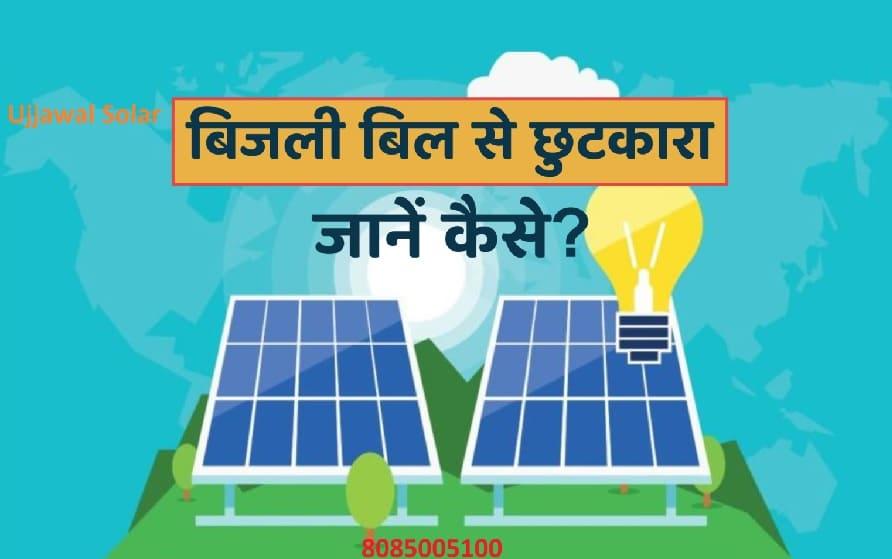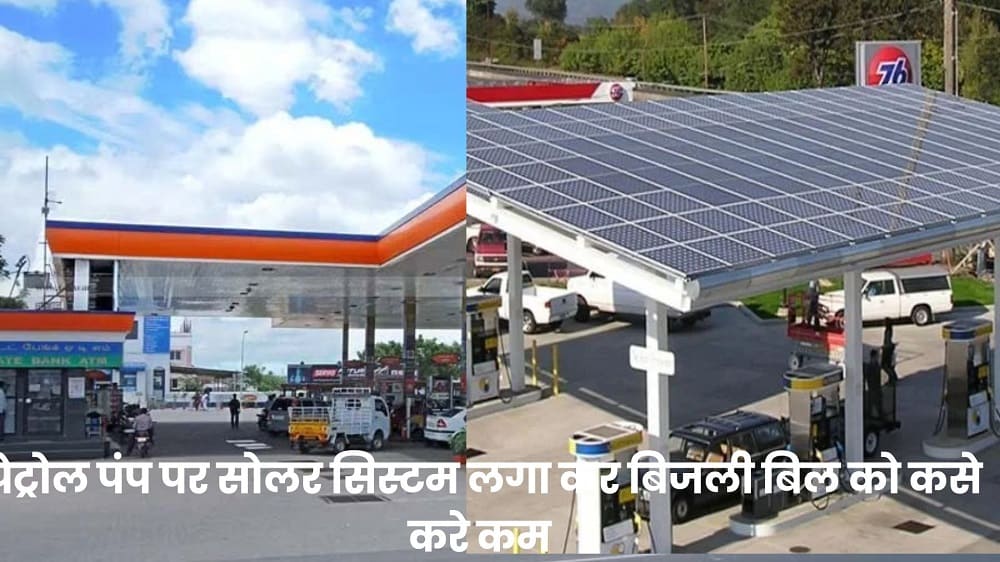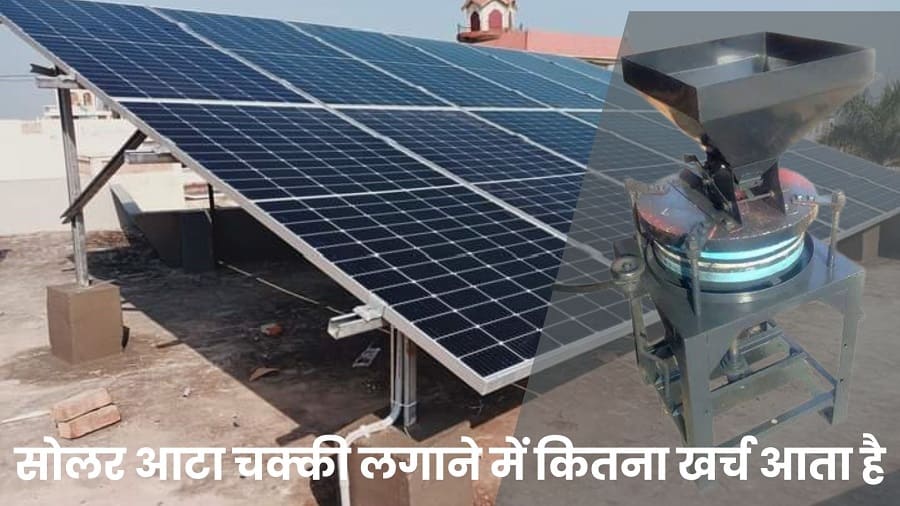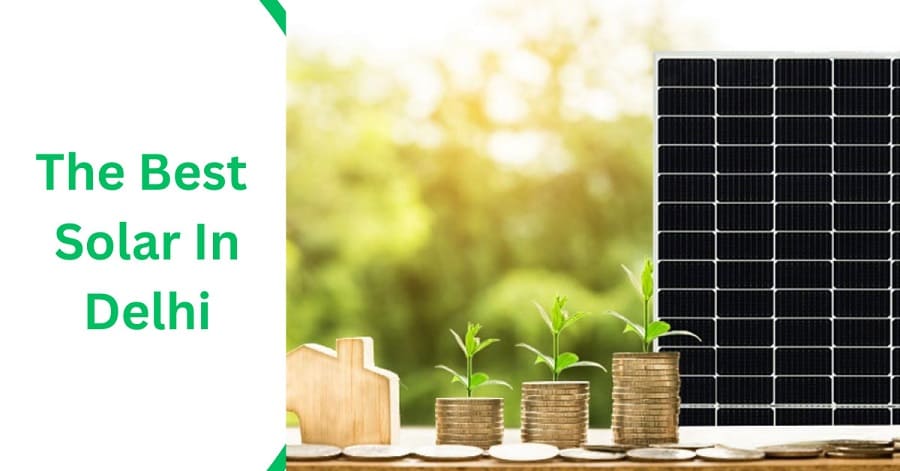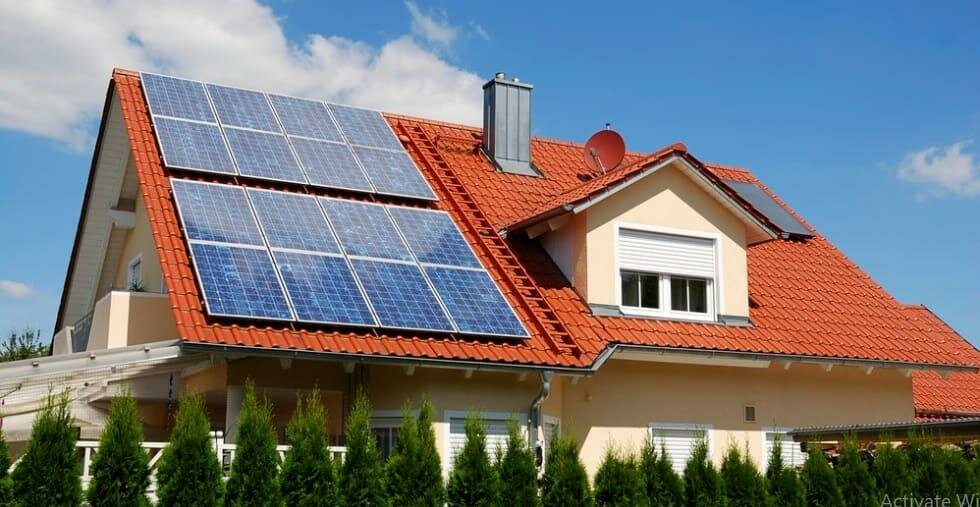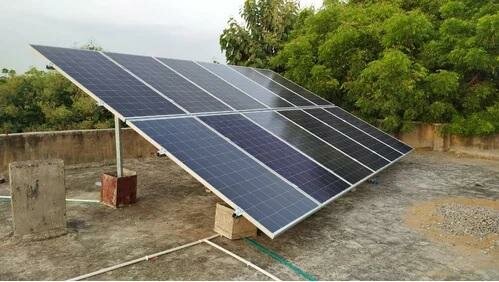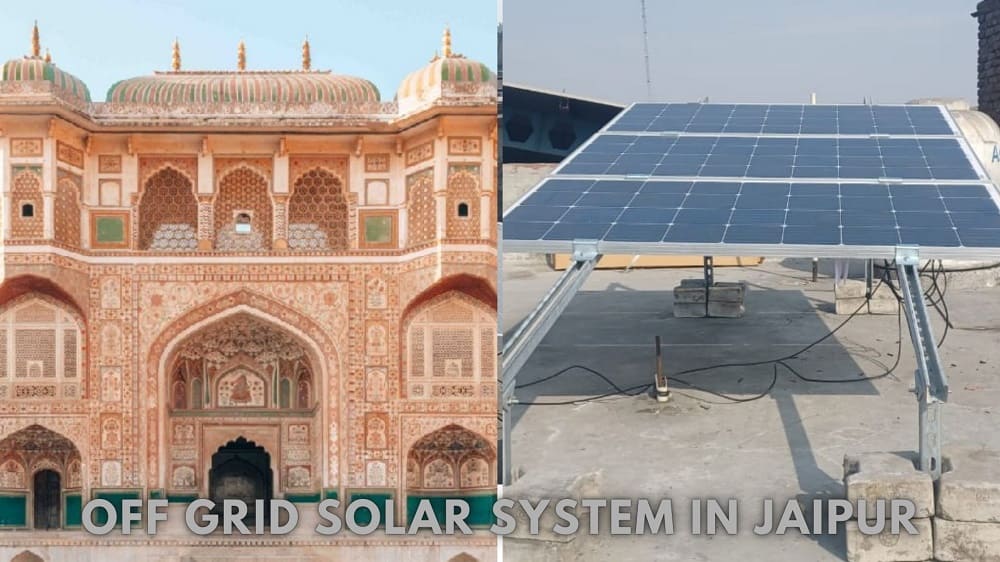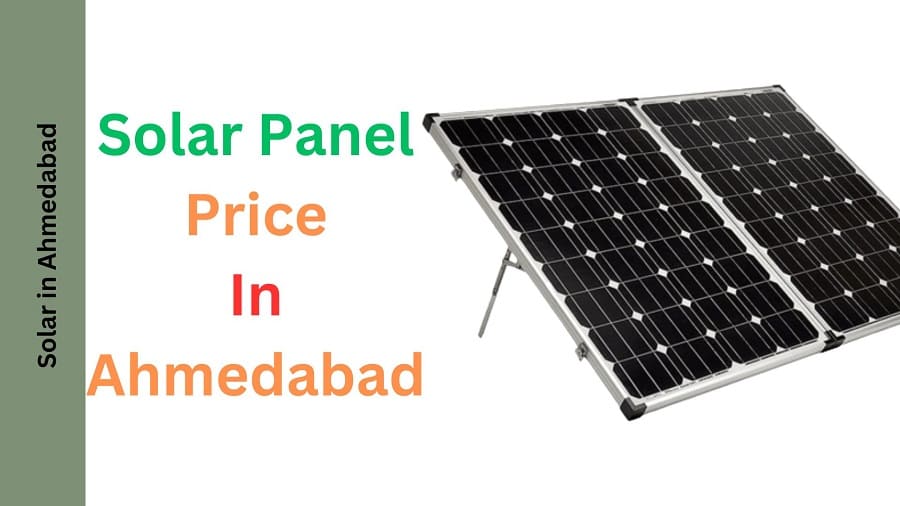Generally, solar panels are installed on rooftops or in open spaces, Therefore Solar panels for homes play an important role in producing clean energy. With time solar panels became increasingly popular among Indian users.
What are Solar Panels
Solar panels are also known as solar photovoltaic panels. Solar Panels is an advanced devices that are designed to Convert the power of sunlight into electricity. Solar Panels Are Made up of solar cells and are usually constructed from semiconductor materials such as silicon. Therefore these panels are able to generate an electric current when they come in contact with sunlight.
We all know about abundant sunlight in India therefore solar panels work as a sustainable and eco-friendly solution for People.
How do Solar Panels Work For your home in India?
Generally, Solar Panels are installed on rooftops, so they continuously capture sunlight during the daytime. When Sunlight falls on solar panels, solar cells capture sunlight and convert it into electricity through a process called photovoltaic technology. These Solar panels typically Made up of solar cells made from semiconductor materials, generate an electric current when exposed to sunlight.
Solar panels always generate electricity in the form of direct current (DC). After with use of a solar inverter, it is converted into alternating current (AC) making it suitable for powering household appliances. This clean and sustainable energy solution not only reduces electricity bills but also contributes to environmental conservation, making it an increasingly popular choice for homes across India.
What are the benefits of installing solar systems for homes in India?
There are many benifits of Installing solar systems for homes in India because solar panels contribute to both environmental sustainability and economic advantages. Here are some key benefits:
- Clean and Renewable Energy: Solar Energy is a clean and renewable energy source that helps reduce dependence on fossil fuels. It also contributes to a lower carbon footprint and mitigating environmental impact.
- Reduced Electricity Bills: By Installing Solar panels for homes in India you can easily generate electricity from sunlight Which provides homeowners an independent and sustainable Electricity. and you can easily reduce your monthly electricity bills.
- Government subsidies: The Indian government offers various subsidies to promote the use of solar Panels. This includes subsidies on solar panel installation, tax credits, and favorable financing options, making the transition to solar power financially attractive.
- Increased Property Value: Homes equipped with solar systems often have higher market values. Potential buyers recognize the long-term cost savings and environmental benefits associated with solar energy, making solar-equipped homes more attractive.
- Low Maintenance Costs: Solar panels have minimal maintenance requirements. Regular cleaning and occasional check-ups are generally sufficient to ensure optimal performance. With a lifespan exceeding 25 years, solar panels offer a durable and low-maintenance energy solution.
- Job Creation: The growth of the solar industry in India has led to job creation in various sectors, including manufacturing, installation, and maintenance. This contributes to the country’s economic development.
- Positive Environmental Impact: By harnessing solar energy, homeowners actively contribute to the reduction of air pollution and greenhouse gas emissions. Solar power is a key element in India’s commitment to sustainable and eco-friendly energy solutions.
- Rural Electrification: Solar systems play a crucial role in rural electrification projects, providing off-grid and decentralized power solutions in areas with limited access to traditional electricity infrastructure.
Solar Energy Facts That You Need to Know
What are the Solar panel installation Cost per kWh in India?
The cost of solar panel installation in India can vary based on several factors Like type of solar panels, capacity, location, and additional components such as inverters and batteries. Please note that these figures are approximate, and actual costs may have changed due to market dynamics and other factors. Additionally, it’s advisable to obtain quotes from local suppliers or installers for precise and up-to-date information. Here’s a rough breakdown:
| Solar Panel Installation Capacity | Cost per kWh (Approximate) | Notes |
|---|---|---|
| Residential (1-5 kW) | INR 40 – INR 60 | Cost includes panels, inverters, etc. |
| Commercial (10-100 kW) | INR 35 – INR 55 | Larger installations may have lower per kWh costs |
| Industrial (>100 kW) | INR 30 – INR 50 | Economy of scale may impact costs |
It’s essential to consider government incentives, subsidies, and tax benefits that may further reduce the overall cost of solar panel installation in India. The costs mentioned here are indicative and may vary based on specific project requirements and prevailing market conditions. For the most accurate and tailored information, consulting with local solar suppliers or installation experts is recommended.
What are the How many Type of solar panels in India
It’s important to note that technological advancements may introduce new types of solar panels or improvements to existing ones. Here the choice of solar panel type depends on various factors, including budget, available space, and specific energy needs. There are Best three types of solar panels commonly used in India:
-
Monocrystalline Solar Panels:
- These panels are made from a single crystal structure, typically silicon.
- Known for their high efficiency and space efficiency, making them suitable for rooftops with limited space.
- Monocrystalline panels tend to perform well in low-light conditions.
-
Polycrystalline Solar Panels:
- Polycrystalline panels are made from multiple crystal structures, which can make them less efficient than monocrystalline panels.
- They are cost-effective and suitable for applications where space is not a limiting factor.
- Polycrystalline panels are a common choice for residential and commercial installations.
-
Thin-Film Solar Panels:
- Thin-film technology involves depositing thin layers of photovoltaic material onto a substrate.
- While less efficient than crystalline silicon panels, thin-film panels are lighter, flexible, and cost-effective.
- They are often used in large-scale solar projects and applications where flexibility is important.
How to improve Efficiency of solar panels Installed for Home
Improving the efficiency of solar panels is crucial for maximizing their energy output and making the most of your solar investment. Here are several strategies to enhance the efficiency of solar panels:
-
Check the Installation Angle of solar panels:
- Ensure that solar panels are correctly oriented to receive maximum sunlight exposure. Panels should face true south (in the Northern Hemisphere) and have an optimal tilt angle based on the geographic location. This allows them to capture sunlight more effectively throughout the day and across seasons.
-
Regular Cleaning of solar panels:
- Keep solar panels clean from dust, dirt, bird droppings, and other debris. A layer of grime can reduce the amount of sunlight reaching the cells and decrease efficiency. Regularly cleaning the panels with water and a mild detergent can help maintain optimal performance.
-
Must Install Solar Tracker Device:
- Solar trackers adjust the position of solar panels to follow the sun’s path throughout the day. This dynamic tracking ensures that the panels are always directly facing the sun, optimizing sunlight absorption and increasing energy production.
-
Install High-Efficiency Solar Panels:
- Invest in high-efficiency solar panels, such as monocrystalline or bifacial panels. These panels can convert a higher percentage of sunlight into electricity, offering better performance in limited space and under low-light conditions.
-
Energy Storage Systems:
- Implement energy storage solutions, such as batteries, to store excess energy generated during peak sunlight hours. This stored energy can be used during periods of low sunlight or at night, providing a continuous power supply and increasing overall system efficiency.
-
Micro-Inverters or Power Optimizers:
- Consider using micro-inverters or power optimizers. These devices optimize the performance of each individual solar panel, mitigating the impact of shading issues and improving the overall efficiency of the entire solar array.
-
Regular Maintenance Checks:
- Conduct regular maintenance checks to identify and address any issues promptly. This includes inspecting the wiring, connections, and overall system health to ensure that all components are functioning optimally.
-
Efficient Inverter Technology:
- Use high-quality and efficient inverters. Inverters convert DC electricity generated by solar panels into AC electricity for use in homes. Investing in advanced inverter technology can improve overall system efficiency.
-
Stay Informed About Technological Advances:
- Keep abreast of advancements in solar technology. Continuous innovation may introduce new materials or design improvements that enhance the efficiency of solar panels.
Know More – Best Ways To Improve Solar Panel Efficiency
Conclusion
As these panels harness the abundant sunlight, they pave the way for cleaner, greener, and more cost-effective power solutions. The photovoltaic magic within the solar cells transforms sunlight into a direct current, which, through the marvel of inverters, becomes the alternating current that powers our homes. Optimal placement, regular maintenance, and the integration of net metering systems further amplify the benefits, allowing homeowners not only to reduce their electricity bills but also to contribute excess energy back to the grid.
FAQs for Solar Panels in Your Home – India
Q1: What is the average cost of installing solar panels for a home in India?
A1: The cost varies based on factors like capacity, location, and type of panels. On average, residential solar installations can range from INR 60,000 to INR 80,000 per kilowatt.
Q2: How much space do I need for installing solar panels on my rooftop?
A2: Space requirements depend on the panel capacity. Generally, 80-120 square feet of rooftop space is needed for every kilowatt of solar panels.
Q3: What government incentives are available for installing solar panels?
A3: The Indian government offers incentives like subsidies, tax credits, and net metering. State-specific policies may also provide additional benefits.
Q4: How long do solar panels last, and what is the warranty period?
A4: Solar panels typically have a lifespan of 25-30 years. Warranty periods vary but often include 25 years for performance and 10 years for product defects.
Q5: Can solar panels work during cloudy days or at night?
A5: While solar panels are most effective in direct sunlight, they can still generate some power on cloudy days. For nighttime, energy storage solutions like batteries can provide continuous power.
Q6: How do I maintain my solar panels?
A6: Regular cleaning, usually with water and a mild detergent, is essential. Periodic checks for any damage or malfunctions and professional maintenance ensure optimal performance.
Q7: Will installing solar panels increase the value of my property?
A7: Yes, homes with solar panels often have higher market values. Potential buyers appreciate the long-term cost savings and environmental benefits.
Q8: Can I go off-grid with solar panels?
A8: Yes, it’s possible with the integration of battery storage systems. These store excess energy for use during periods of low sunlight or at night.
Q9: How can I calculate the payback period for my solar panel investment?
A9: Divide the total cost of installation by the annual savings on electricity bills. The result is the number of years it will take to recover your investment.
Q10: Are there financing options available for solar panel installations?
A10: Yes, various financing options, including loans and leasing, are available. Additionally, some states offer financial incentives to promote solar adoption.

